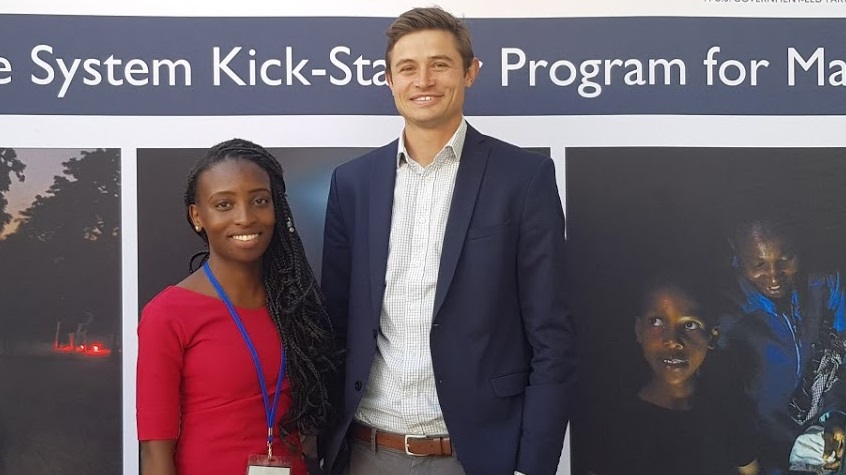South Africa’s esports scene is set for a major showdown as Hyprop and MTN introduce SHIFT COD, a Call of Duty tournament forming part…
SA startup Yellow lands $725k to help distribute solar energy device in Uganda, Malawi

SA startup Yellow may just have closed a $725 000 raise from local and international investors, but the two-year-old company which sells pay-as-you-go solar-power devices to African households, almost shut its doors until a tech platform the founders designed helped save the business.
“We gained almost no traction at all and after a year of leaving our jobs came close to shutting the business down,” co-founder Michael Heyink (pictured above with Yellow staff member Cynthia Makunganya) told Ventureburn, following the conclusion of the round which involved a local private equity company and a syndicate of local and US angel investors.
Both the private equity firm, and those that took part in the syndicate of angel investors that involved South Africans and a New York based investor declined to be named.
The deal was signed in May, but only went through earlier this month, because of the paperwork involved. It follows a €2-million loan the startup raised from Swedish crowdfunding platform Trine and a $1-million grant from USAID. Both agreements were concluded earlier this year.
The platform changed everything, and the business developed huge traction, says Yellow co-founder Michael Heyink
It was while working at a Johannesburg based private equity firm Metier, which finances a number of energy deals on the continent, that Heyink saw the opportunity to start a business providing pay-as-you-go solar power to African households.
After leaving the private equity firm he set off to Zimbabwe and Malawi (where he met fellow co-founder Maya Khonje-Stewart). But in the beginning things didn’t go as planned.
“We learnt the hard lessons of trying to operate a business in Africa. We sat for hours under trees with chiefs and drove through hundreds of places that aren’t on the maps,” he recalls.
Recruiting agents to sell the devices soon proved a slow and expensive process. “We’d ask who wanted to be an agent and 500 people would put up their hand,” he says.
‘Web platform changed everything’
Back in Cape Town, and partly as a way to try run the business remotely, Heyink began building a web platform, dubbed Ofeefee.
“The platform changed everything. The business developed huge traction.
“We substituted meetings under trees for automated recruitment workflows and soon the business was thriving and attracting heavyweight investors and funders,” he says.
Shortly before signing the deal with investors for $725 000, the startup raised €2-million in debt from mostly Swedish members of the public on Trine.
In May, it also secured a $1-million grant from USAID after coming out tops in its Malawi Kickstarter Programme. The USAID grant will be paid out as the business meets certain milestones in devices issued.
To be eligible for the full $1-million, the startup must sell 67 000 devices. So far, since July when the grant kicked in, the startup has sold 4000 devices.
So far the startup has installed 7500 such devices in Malawi (against a serviceable market that he estimates to be two million) and aims to begin operating in Uganda (which he reckons has a serviceable market of about seven million customers) by January next year.
The team has also grown. Heyink and Khonje-Stewart were joined by Ross Thompson, a former Rand Merchant Bank financier last year, while Ben Walwyn, a former actuary from Discovery Bank joined earlier this year. Both Thompson and Walwyn can also code.
In all the startup now has 12 employees and 60 agents.
The devices themselves are provided by a New York based supplier and are manufactured in China.
While the devices only allow users to power lights, recharge smartphones and power a radio, Heyink says Yellow will on Thursday ship the first 150 of its expansion packs, from Tanzania. These will allow users to power televisions sets, by plugging into the initial Yellow devices they’ve purchased.
First entitled to these expansions packs will be customers who are regularly honouring repayments.
The devices cost $150 and a customer has 24 months to pay it off in. Repayments are charged at 2.5% to 3% a month, which Heyink points out is less than the 5% to 6% a month charged by micro financiers on the continent.
Incentives, remote control
A number of tech firms already operate in the sector on the continent, including Kenya’s M-Kopa, Berlin based Mobisol and UK-based BBoxx.
Many of these startups have battled to break even, says Heyink, partly because these platforms have had to spend a lot on hiring massive teams to help distribute devices. But he reckons that his startup’s web platform will help his startup prove more sustainable.
Already using the platform has allowed the startup to simplify the process of recruiting agents by dropping links on social media platforms and focusing these links on those in the nearby area.
“Now I’m sitting in South Africa and I’m getting hundreds of people clicking our links,” adds Heyink.
In addition, Heyink and his partners use a “Discovery Vitality type of system” of incentives to ensure customers stick to repayments, that agents are driven to make sales and that staff in the startup’s Lilongwe office are able to rehabilitate those customers that miss payments.
For example, staff in the Lilongwe office who spot customers who have missed payments can score points if they successfully help rehabilitate a customers who is not sticking to their repayment. The points inform how big their salary is at the end of each month.
The startup is able to track stock through a smartphone app and a regular stock take. In two years he says only two devices have gone unaccounted for (these he reckons were devices he and his team took to show investors).
He says too many South African entrepreneurs fear doing business in the rest of the continent because they believe customers and suppliers will steal from them, but Heyink doesn’t believe Africa is to blame. “It’s not an Africa thing, it’s an incentives thing,” he explains.
With a market of about 600 million Africans who don’t have home electricity, Heyink is feeling pretty bullish about Yellow’s chances. Adds Heyink: “It’s super exciting, because we’re getting the traction.”
Editor’s note (25 November 2019): Subsequent to the publication of the initial article, we’ve included that both co-founders Rob Thompson and Ben Walwyn can, like fellow co-founder Michael Heyink, can also code.
Featured image: Yellow co-founder Michael Heyink with Yellow staff member Cynthia Makunganya (Supplied)

